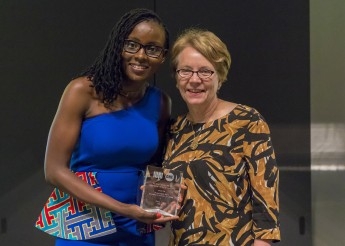
Juma accepts award for Excellence in African Storytelling in honor of Michael Elliott from his widow, Emma Oxford. Photo: Steve Strasser
African journalists committed to shedding light on poverty, corruption and other key issues should set the standard for coverage of their continent, said Mercy Juma, a Kenyan broadcaster who received a prestigious new award in honor of celebrated editor and philanthropist Michael Elliott.
“I receive this award at a time when one of Africa's biggest problems is that it is not allowed to tell its own stories, said Mercy Juma, who has covered sensitive topics such as teen pregnancy and birth control in remote Muslim communities. “The agenda for African news is still being decided outside Africa.” But she told a gathering of media leaders and supporters that she is encouraged by international efforts like the Elliott award “to advance storytelling in Africa by African journalists.”
Juma was in New York City to accept the inaugural Michael Elliott Award for Excellence in African Storytelling, given by the International Center for Journalists (ICFJ) in partnership with ONE and the Elliott family.“ She was chosen from among 354 applicants.
“Mercy was selected for her unique ability to bring to life the stories of often-voiceless Kenyans who face difficult challenges and aim to overcome them, ” Norman Pearlstine, vice chairman of Time Inc. and chief information architect of Money.Net. Pearlstine, who chaired the international panel that chose Juma, presented the award, along with Emma Oxford, Elliott’s widow.
“Such recognition should remind all of us who believe in the power of the pen of the huge role that we play in the society,” said Juma in her acceptance remarks. “It should remind us of how powerful media is but at the same time of the great responsibility bestowed upon us.” Juma worked as a health and science reporter for Kenya’s Nation Media Group until recently when she began a job with BBC Africa.
“There are big challenges in Africa,” she noted. “Teenage pregnancies, poverty, unemployment, corruption, poor governance. And they could be overwhelming if we let them. But we will not let them.” She said African journalists would help to tackle these problems “through storytelling that holds those in power accountable, that fights for the rights of the less fortunate, that asks questions that make people uncomfortable.”
The award honors Elliott’s mission to use great storytelling as a tool for empowerment. Elliott died last July after serving as president and CEO of ONE, Bono’s foundation. Previously, he was a top editor at three great newsmagazines - TIME, Newsweek and The Economist. He served as a member of the ICFJ board of directors for eight years.